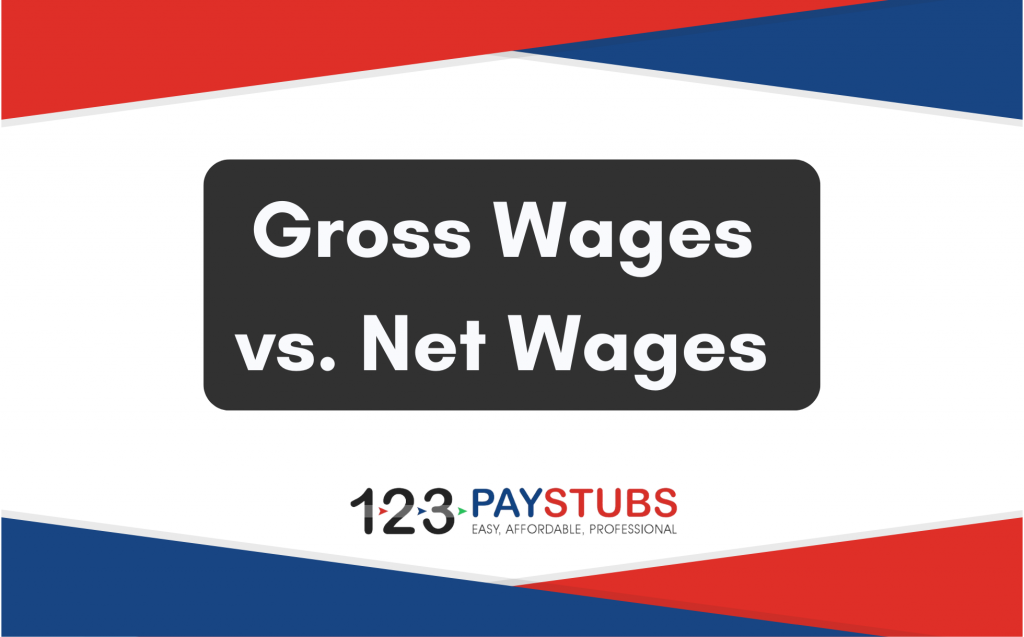Gross Wages vs. Net Wages

Two important terms you should be aware of in terms of payroll include gross wages and net wages. Both of these terms will appear on employees’ pay stubs.
While online pay stub generators such as 123PayStubs can calculate your employees gross and net pay automatically, it is still important to have a strong understanding of what these terms means.
Below we discuss what gross wages and net wages are and how to calculate them:
Gross Wages
Gross wages are the total amount you pay an employee before you withhold taxes and other deductions. The majority of an employee’s gross ages typically consist of their base pay such as their salary, hourly pay, or tips.
An employee’s total gross wages can vary depending on a few factors:
- Wage rate
- Overtime pay
- Other types of pay (ex. Double time)
- Pay frequency
Calculating Gross Pay
When it comes to calculating gross pay, it largely depends on if the employee is paid on an hourly basis or salaried.
To calculate gross pay for hourly employees, multiply the hourly rate by the hours worked during a pay period.
For salaried employees, gross pay is equal to their annual salary divided by the number of pay periods in a year.
| Pay Schedule | Pay Periods |
| Weekly | 52 |
| Bi-Weekly | 26 |
| Semi-Monthly | 24 |
| Monthly | 12 |
Net Wages
Net wages are what an employee earns after taxes and deductions. So, this is the amount of money the employee is taking home with them.
Factors that can affect net pay include
Federal income tax withholdings
- Employees’ will have income tax deducted from their paycheck. To calculate your employee’s income tax withholdings, you’ll need your employee’s filing status, withholding allowance, gross wages, and your payroll schedule. You can find most of this information on your employee’s Form W-4.
State income tax withholdings
- Depending on where you live, you may also have state and local income tax withholdings.
Social security and Medicare Taxes
- FICA payroll taxes go towards your employees’ Social Security and Medicare. FICA taxes are 15.3% of your employee’s gross pay after pre-tax payroll deductions. Employers are required to pay half of this tax (7.65%). The employee’s portion is deducted from their gross pay.
Wage garnishments
- Wage garnishments may include child support payments, delinquent student loans, unpaid taxes, or credit card debt. If an employee has a wage garnishment, the employer will be notified by the government and informed of the amount of money they need to withhold from each paycheck.
Voluntary Deductions
- Voluntary deductions are payroll deductions that your employee chooses to have withheld from their paycheck, but aren’t required by law. These deductions may include retirement contributions, health benefits, commuter benefits, etc. These are pre-tax deductions which means they are taken out of an employee’s pay before mandatory payroll taxes.
Calculating Net Pay
To calculate net pay, you should first start by calculating an employee’s gross pay. Next, you should deduct any pre-tax contributions such as health insurance premiums. You can then withhold all taxes, including federal income tax, FICA taxes, and state and local taxes. Lastly, if the employee has any court-ordered payments, you can deduct those as well.
123PayStubs
123PayStubs is the IRS-authorized online pay stub generator your small business needs! With 123PayStubs, you can create professional pay stubs at a low cost. 123PayStubs’ will ensure all of your taxes and deductions are accurate with our automatic calculations. Take the hassle out of your payroll with 123PayStubs!

Leave a Comment